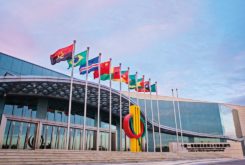The last summit of the Community of Portuguese Speaking Countries (CPLP), held on 17-18 July in the island of Sal in Cabo Verde, took place in an overall orderly manner. This was a relief for government and diplomatic circles, especially in Portugal, that will host the organisation in 2019-2020.
However, the prospects for the near future of CPLP, which is now 22 years old, are anything but bright; especially in the business area.
Financial problems have troubled the organisation for the last few years. Quota payments are frequently in arrears, mostly by African countries.
The recent lack of initiative and political stalemate is being compensated with a growing interest in the economic and business fields, but in the meantime, disputes are jeopardising future developments.
The promotion of CPLP’s business structures was mainly encouraged by the former Executive Secretary Murade Murargy, from Mozambique. This has been pursued by his successor from São Tomé and Príncipe, Maria do Carmo Silveira, and particularly by the influential director general of the CPLP, Georgina Mello, from Cabo Verde.
At the moment, business circles in close connection with Mozambican Salimo Abdulá, president of the CPLP Business Confederation (CE-CPLP), and Portuguese Mário Costa, vice-president of CE-CPLP and president of the CPLP Union of Exporters (UE-CPLP), notice a progressive distancing between the two individuals – both of whom have been the vectors of the organisation´s business strategy.
The culmination of this distancing, according to our sources, was the recent communication by the CPLP to UE-CPLP that it should no longer use the reference “CPLP” in its designation.
With an undetermined status relative to the CPLP itself, the UE-CPLP has become an “arm” of CE-CPLP; organising events, meetings, and business missions, while also providing services (consulting, marketing, and more).
CE-CPLP was established in 2010 from the CPLP Business Council.
The representation of CE-CPLP, as a private interlocutor on behalf of CPLP, was formally recognised at the organisation’s 10th Conference of Heads of State and Government, held in Dili (TL) in July 2014.
Recently, key associations, such as AIP, have moved away from CPLP’s business entities due to the profile of some of its protagonists and commercial approaches towards companies that are not in line with the organisation’s statutory purposes.
The chairman of Portugal´s AIP, Rocha de Matos, is known to have reservations about the actions of the CE-CPLP; resulting in his resignation as chairman of the board of the general assembly.
Several cases regarding subordination of the organisation to the interests of companies were identified in initiatives under CPLP.
CE-CPLP regional delegations have also been set up, as well as some of its delegates being replaced.
A “PALOP Nucleus” of the CE-CPLP was created, directed by Angolan Eliseu Gaspar, from the Angola Industry Association (AIA).
Salimo Abdula has directed or has been directly involved in many of business ventures connected to former Mozambican president Armando Guebuza.
He was promoted to president of CE-CPLP with the support of Murargy, as Executive Secretary of the CPLP. His wife, Maria Assunção Abdula, later joined the CE-CPLP as vice president, representing the Federation of Women Entrepreneurs (FME).
Also involved in controversy is the Lusophone Agricultural Chamber (CAL), an entity recognized by several Portuguese ministries and also by CPLP.
AICEP Portugal Global, Portugal´s main trade agency, has also been collaborating with CAL.
Jorge Santos, president of CAL, is under accusations of qualified fraud – and being investigated by the Public Prosecutor’s Office (Department of Investigation and Criminal Action), for funnelling to companies owned by himself, official grants to CAL, some Portugal 2020 programs, and others from European funds).
Bank statements of the organisation have been sent to Portuguese media, showing transfers by CAL to companies owned by Jorge Santos.
CAL (formerly known as the Chamber of Lusophone Agriculture) had already been accused of irregularities in the application of public funds – and its directors were subject to sanctions. However, after a simple redenomination of the organisation and registration with another tax identification number, CAL continued to access public funds, until now.
Among CPLP member states, relations have been tense in 2017.
The Sal summit was preceded by intense disputes – in public and in private – between the Portuguese and Angolan diplomacies, that threatened to poison the event.
While the Portuguese justice insisted on bringing the former Angolan vice-president Manuel Vicente to be trialled in Lisbon for allegedly bribing a magistrate, the Angolan government threatened to block the nomination of the Portuguese executive secretary, and even leave CPLP altogether.
At the same time, Angola signed agreements with the Commonwealth and Francophonie.
The issue only left the CPLP agenda after the Portuguese prosecutor, following a high court ruling, agreed to send the process for trial in Luanda.
Following the summit, Cabo Verde is set to take over CPLP´s presidency from Brazil; which diplomatic sources say has become more and more detached from CPLP, due to the greater focus on domestic affairs.
From 2019, over the next two years, Portugal plans to take over the executive secretariat, replacing São Tomé and Principe. In the Sal meeting, the Portuguese ambassador Francisco Ribeiro Telles was approved by CPLP member countries to take over the position.
Due to the agreement reached at the 2016 CPLP Summit, to circumvent the opposition of the African bloc to the appointment of the Portuguese executive secretary (at a time when João Gomes Cravinho, former Secretary of State for Cooperation had already been selected by Portugal), the upcoming Portuguese mandate (2019-2020) will be shorter than the usual four years (two consecutive two year mandates). São Tomé and Príncipe named the executive secretary for the 2017-2018 mandate.
At the summit, a key issue was the presidency for the 2021-2022 mandate.
According to the alphabetical system of rotation, it should be Guinea-Bissau’s turn to succeed in Cabo Verde as CPLP chair. However, given the domestic political instability, the Guinean government relinquished its statutory right.
In Sal, president José Mário Vaz was more focused in obtaining financial assistance (around EUR 3 million) from CPLP member countries in order to hold the legislative elections in November this year.
Equatorial Guinea engaged in an intensive diplomatic lobby in order to take advantage of the situation and secure the CPLP presidency in the biennium.
Supporting Teodoro Obiang’s efforts at the summit was Murade Muragy, Mozambican and CPLP executive secretary at the time of Equatorial Guinea’s adhesion, and now advisor to the Malabo Government.
Portuguese president Marcelo Rebelo de Sousa, the main opponent of Obiang’s aspirations, claimed Equatorial Guinea was in no condition to carry on the work of Cabo Verde. Soon after the rejection of Malabo´s proposal, Obiang left the summit in protest.
His foreign minister justified the president´s departure with urgent matters to be solved in Malabo.
At the end, the solution was for Angola to take over the presidency from Cabo Verde.
Adding to Angola´s increasing weight at CPLP, the country will also be responsible to replace the current director general of the CPLP, Georgina Mello, after 2019.
Mello is considered one of the most influential figures in CPLP´s structure.
At the same time, Angola intends to lead and establish the group of lusophone African countries (“PALOP Forum”), that has its own agenda, and usually meets prior to CPLP summits, to establish common positions among these six countries (Angola, Mozambique, Cape Verde, Sao Tome e Principe, Guinea-Bissau, and Equatorial Guinea).
Angolan diplomacy has even mentioned the intention to build appropriate headquarters for PALOP Forum, in Luanda – which would in fact create a “parallel CPLP”.



